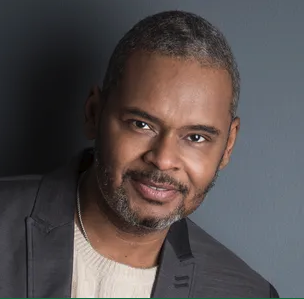Columbia College | Columbia University in the City of New York
Ron Simons ’82, BUS’89, Producer Who Won Four Tonys

Simons took a circuitous route to Broadway success. Born in Detroit on November 30, 1960, he caught the acting bug when he played a sharecropper in a high school production of Finian’s Rainbow. But he knew that the profession was financially risky and that his family needed his help, so he put the idea of acting on hold.
“I thought: ‘OK, one day. Not today,’” he said. “‘Maybe not tomorrow. Maybe not even next year, but you will become an actor. You will become an artist and move into the entertainment space.’”
Simons majored in English and computer science at the College and began his professional career as a software engineer at Hewlett-Packard. Three years later he was hired as an applications project manager by IntelliCorp; he moved to Microsoft in 1989 as a product manager. He earned an M.B.A. from the Business School in 1989 and an M.F.A. from the University of Washington in 2001.
Simons took the acting plunge in 1992, leaving Microsoft to act with the Classical Theater of Harlem, Seattle Repertory Theater, the Utah Shakespeare Festival and the Cincinnati Playhouse in the Park. He also performed on television, appearing in the Law & Order franchise and other series. But eventually he became disenchanted with the roles he was offered, so he turned to producing in 2009. He believed that his experience as an actor and businessman would serve him well in this role.
“I’ve found that many businesspeople can handle the question of financial viability but can’t judge a good story, so as an artist I also have that area of expertise,” he told DC Theatre Arts in 2020. “Plus, even if it’s a good story, it has to be crafted to take it to the stage, so the leadership must understand how to get it there.”
His first project as a producer was Night Catches Us, a 2010 film about a former Black Panther who returns home to Philadelphia for his father’s funeral. “I was really taken by the script because I had never seen a movie where the characters were two former Black Panthers,” he said in a 2015 interview with University of Washington magazine.
Simons produced both movies and stage works, but achieved acclaim for his theatrical work. He was one of the producers of The Gershwins’ Porgy and Bess, which won a Tony for best revival of a musical in 2012, and the next year he won a Tony, for best play, for Vanya and Sonia and Masha and Spike, a comedy by Christopher Durang about three middle-aged siblings. In 2014, he won his third Tony, for best musical, for A Gentleman’s Guide to Love & Murder, and three years later, his fourth, for best revival of a play, for Jitney, by August Wilson, about a storefront taxi company in a Black neighborhood in Pittsburgh.
Simons made it his mission to produce projects about underrepresented people and communities, recognizing that staging works about, and by, people of color was difficult because there were few producers like him and because of the perception that stories about Black people are not commercial enough for Broadway.
“In these political times, it is so, so important to share works of diverse voices,” Simons said in an interview in 2017 with WAMC-FM in Albany, N.Y. He added, “It’s really key that we uphold and promote and give voice to these diverse voices who are under siege right now and those who might not be directly under siege but who are ignored by mainstream entertainment and arts organizations.”
Simons was an active alumnus who received a John Jay Award for distinguished professional achievement in 2018. He was a member of the Black Alumni Council, Columbia Alumni Singers and Columbia University Band Alumni Association; received the Black Heritage Award in 2006; and had been on the Columbia College Board of Visitors and the Columbia College Alumni Association Board of Directors.
— Alex Sachare ’71
Issue Contents
Published three times a year by Columbia College for alumni, students, faculty, parents and friends.
Columbia Alumni Center
622 W. 113th St., MC 4530, 6th Fl.
New York, NY 10025
212-851-7852
cct@columbia.edu
Columbia Alumni Center
622 W. 113th St., MC 4530, 4th Fl.
New York, NY 10025
212-851-7488
ccalumni@columbia.edu

